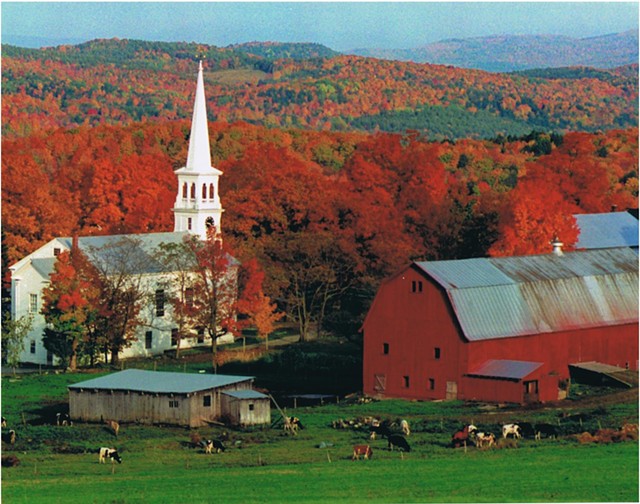
- Courtesy of Peacham Congregational Church
- Peacham Congregational Church
Who's to argue? (Except maybe Craftsbury.)
"The church has been photographed a lot," local historian Johanna Branson said. "A lot, a lot, a lot."
Now the Peacham Congregational Church is seeking selfies — that is, asking photographers to submit images of the handsome white clapboard structure whose spire pierces the village sky, and whose glory days are perhaps behind it. In the "Most Photographed" competition, money will be raised by people voting for their favorite picture at the July 16 Peacham Community Picnic, paying $1 each to cast a ballot.
The contest will raise money to help repair the building's clapboards and foundation, and to spruce up the paint job.
The requirements for eligibility are broad: The church could be shot in any season and from any vantage point. The picture could be half a century old, or it might be shot next week.
Its architectural beauty notwithstanding, the church's history makes it a worthy subject. The congregation was formed in 1794 and its 39 members raised money to construct a church in the early 1800s, according to Branson. It is one of the 15 oldest church buildings in Vermont.
The church was built in 1806 by Edward Clark, an acclaimed designer/builder who had previously constructed a church in Newbury. The Peacham church's original site was at the top of the hill in a part of town called Academy Green.
"He constructed a relatively simple structure, with a 100-foot-high bell tower, completely surrounded by a big complex of stables," Branson said. People would spend the day at church, leaving their horses and buggies in the stables.
The church bell was cast in the Boston foundry of Paul Revere, making it one of 300 to 400 church bells crafted in that historic metal shop, according to Branson.
In 1844, the Peacham church was moved down the hill to its current location. Picking a site caused turmoil in the town, and the services of a mediator were required to help resolve the issue, she noted.
When the building was remodeled in 1870, an organ was installed. The instrument was the gift of Peacham resident and abolitionist Oliver Johnson — presented as an attempt to "resolve differences within the congregation," in Branson's words. His brother and fellow abolitionist Leonard Johnson tolled the church bell for one hour when he learned of the December 1859 hanging of John Brown in West Virginia.
The photo contest is at least the second competition in the 223-year history of the Peacham Congregational Church. When the congregation was formed, 79 would-be ministers auditioned for the job, preaching before the congregants, Branson said. Leonard Worcester won the part, and served as minister from 1799 to 1839.
"He oversaw the construction of the church and the growth of the congregation during Peacham's early years," Branson wrote in an email.
The idea for the photo contest belongs to Hanna Galinat, a member of the congregation who works in church outreach.
"I thought it would be a fun way to call attention to the church facelift," she said.
Amateur shutterbugs, take note: Photographer Richard Brown, a Peacham resident, will give feedback to the participating photographers on their church pictures. Submit photos by July 9 here.
Speaking of...
-

Video: Visiting the Kellogg-Hubbard Library’s PoemCity in Montpelier During the Month of April
Apr 18, 2024 -

Q&A: Catching Up With the Champlain Valley Quilt Guild
Apr 10, 2024 -

Video: 'Stuck in Vermont' During the Eclipse
Apr 9, 2024 -

Slideshow: Scenes From the Total Solar Eclipse in Vermont
Apr 8, 2024 -

New Jersey Earthquake Is Felt in Vermont
Apr 5, 2024 - More »





Comments
Comments are closed.
From 2014-2020, Seven Days allowed readers to comment on all stories posted on our website. While we've appreciated the suggestions and insights, right now Seven Days is prioritizing our core mission — producing high-quality, responsible local journalism — over moderating online debates between readers.
To criticize, correct or praise our reporting, please send us a letter to the editor or send us a tip. We’ll check it out and report the results.
Online comments may return when we have better tech tools for managing them. Thanks for reading.